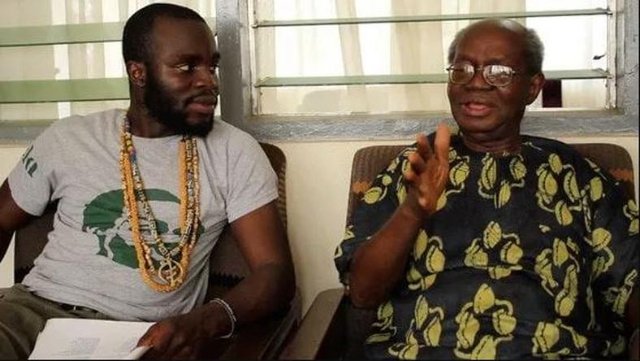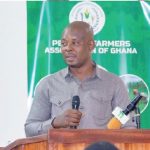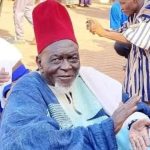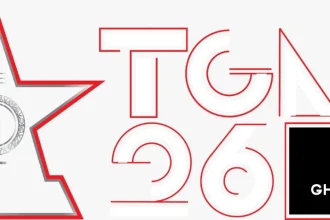Rapper M.anifest is celebrating one of the monumental forces behind his successful music career, Prof Joseph Hanson Kwabena Nketia.
He is thanking the man, one of Ghana’s foremost composers who vetted most of his songs, for the positive impact he has had on his life, personally, and on Ghana as a whole.
Considered Africa’s premier musicologist, the renowned professor passed away on Wednesday, March 13 at 97. His death was confirmed at the Legon Hospital in Accra.
Remembering Prof J. H. Kwabena Nketia, who was his grandfather, M.anifest said in a post on Instagram that, “Overwhelming legacy. A life well lived. Grandpa, thank you.”
“Your humanity was your greatest composition ❤️✨🖤,” he added.
The rapper also shared a video of one of his fondest times with the music professor.
In the video, Prof Kwabena Nketia is seen showing off his rap skills – a rap he wrote while in school in London in the 1940s – to the delight of M.anifest.
Born on June 22, 1921, Prof Kwabena Nketia was a well-known ethnomusicologist and composer.
He was called a “living legend” and “easily the most published and best-known authority on African music and aesthetics in the world”, with more than 200 publications and 80 musical compositions to his credit.

Biography:
Born in 1921 in Mampong J. H. Kwabena Nketia was his parents’ only child.
On a government scholarship, he went to Britain at the age of 23 to attend the University of London from 1944 to 1949, beginning with two years of study in linguistics at the School of Oriental and African Studies.
In 1949 he began three years’ study at Birkbeck College, University of London, and Trinity College of Music, London, obtaining a B.A. degree.
In 1958 a Rockefeller Fellowship allowed him to go to the United States, where he attended Columbia University (studying with Henry Cowell), the Juilliard School, and Northwestern University, studying musicology and composition.
He was a professor of music at UCLA and the University of Pittsburgh, and has lectured in many prestigious universities worldwide, including Harvard University, Stanford University, University of Michigan, City University London, the University of Brisbane in Australia, the University of Kansas, Lawrence, and the China Conservatory of Music, Beijing.
He was a professor of music at the University of Ghana, Legon, Accra, where he began teaching in 1952. He directed the International Centre for African Music and Dance (ICAMD).
He introduced, for example, the use of the more readable 6/8 time signature in his compositions as an alternative to the use of duple (2/4) time with triplets that was used earlier by his mentor, Ephraim Amu.
Although this practice undermined Amu’s theory of a constant basic pulse in African music and generated debate, Nketia pointed out that the constant use of triplets in a duple time signature was misleading.
Many scholars nowadays have found his theory useful in transcribing African music.
He has composed for both Western and African instruments and has written more than 200 publications, including his world-acclaimed The Music of Africa, which has been translated into German, Italian, Chinese, and Japanese.

Awards and honours:
Nketia has been honoured with many awards in Ghana, including the Companion of the Order of the Star of Ghana, the Grand Medal of the Government of Ghana (Civil Division), a DLitt (Honoris Causa) of the University of Ghana, the Ghana Book Award, ECRAG Special Honour Award (1987), Ghana Gospel Music Special Award (2003), and the ACRAG Flagstar Award (1993). He is a Member of Honour of the International Music Council.
Other international awards he has received include the Cowell Award of the African Music Society; the ASCAP Deems Taylor Award, for The Music of Africa (1975); the IMC-UNESCO Prize for Distinguished Service to Music; the 1997 Prince Claus Award; and the Distinguished Africanist Award of the African Studies Association of the USA (2000).
In 2009, the Nketia Music Foundation was formed “to promote the conservation and development of Ghana’s Creative Legacy in contemporary contexts, and the use of the works of Emeritus Prof. J. H. Kwabena Nketia and other composers for the development and growth of music and culture”.
On 27 February 2012, Goucher College presented “Tradition, Creation, and Life: A Celebration of Professor Joseph Hanson Kwabena Nketia and the Music of Ghana”.
In June 2015, in commemoration of his 94th birthday, the Governing Council of the African University College of Communications (AUCC) held the official launch of the Kwabena Nketia Centre for Africana Studies.
Following his 96th birthday, a festival was held in celebration of his life and achievements at the Kwabena Nketia Centre for Africana Studies at the African University College of Communications, Adabraka-Accra, under the patronage of Ghana’s President Nana Addo Dankwa Akufo-Addo, who paid tribute to Nketia as “one of the legends of the ages”.
Also in attendance were former President Jerry Rawlings and his wife Nana Konadu Agyeman Rawlings, and representatives from former President John Dramani Mahama and former President John Agyekum Kufuor.
The Asantehene Osei Tutu II, in a speech read on his behalf at the festival on 27 September 2017, said: “Emeritus Prof. Nketia’s life symbolises the evolution of our nation in the 20th century. There are many parallels in his life’s story, which mirrors the national endeavours in the country. A bridge between our indigenous culture and modern culture, non-literate and literate traditions, old and young artists, Ghana and Africa in the dissemination.”
The event was also to raise funds in order to collate, digitise Professor Nketia’s “thousands of archival files and field notes on Ghanaian culture, history, language, arts, material culture”.

Books:
• 1963 – African Music in Ghana. Northwestern University Press
• 1974 – The Music of Africa. W. W. Norton.
• 2004 – African Art Music/The Creative Potential of African Art Music in Ghana.
• 2005 – Ethnomusicology and African Music – Collected papers, Volume One: Modes of Inquiry and Interpretation. Accra: Afram publications.
• 2016 – Reinstating traditional music in contemporary contexts: reminiscences of a nonagenarian’s lifelong encounters with the musical traditions of Africa.
Source: Myjoyonline
















